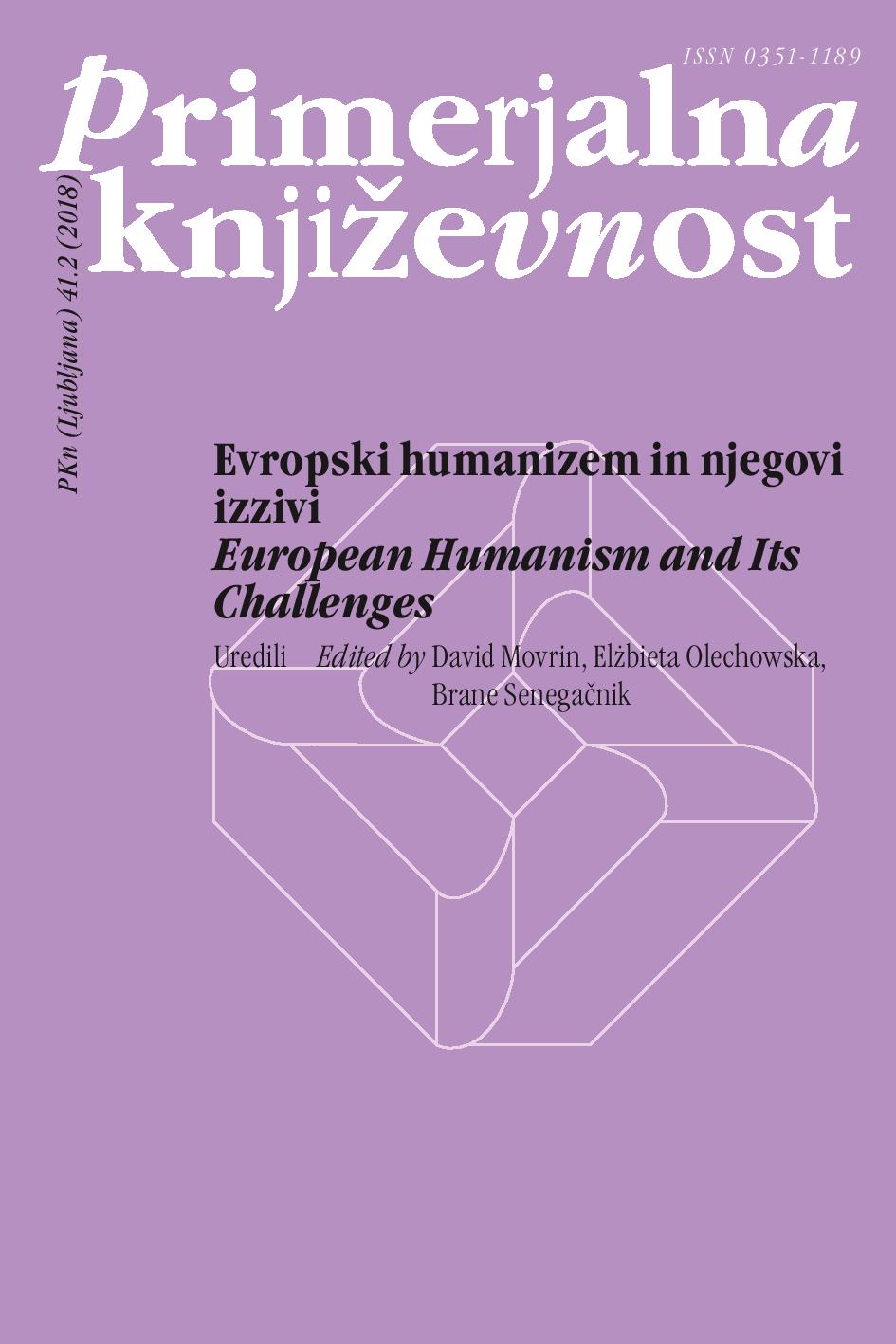Humanist Readings of Antigone and Humanist Understanding of Human
Keywords:
Greek literature, tragedy, Sophocles, Antigone, literary interpretation, humanism, humanity, literature and ethicsAbstract
(Early) Humanist reception of Greek tragedy is characterized by Aristotelian interpretation of tragedy according to contemporary understanding of Poetics (Lurie, Mola). In this frame Sophocles’ Antigone was more or less flattened into a moral object lesson about the punishment of a tyrant abusing his power. Humanist commentators and translators showed very little interest in the play’s literary and philosophical complexity that made it one of the most admired and influential texts of the Western culture over the past three centuries. However, we should not overlook the excessive tendency towards intellectualization of tragedy, characteristic of many major modern readings (M. Heath), on the one hand, and the expectations of the original audience, on the other: in both its literary and political context tragedy was supposed to teach (N. Croally). Admitting that there is a moral to Antigone does not involve using simple moralistic terms like those used by e.g. Camerarius; one would rather see it as a hint at indispensability of individual human being both for the correct understanding of human nature and for ethical being in the world.References
IZDAJE IN KOMENTARJI SOFOKLOVE ANTIGONE
Griffith, Mark (izd.). Sophocles: Antigone. Cambridge: Cambridge University Press, 1999.
Kamerbeek, J. C. The Plays of Sophocles: Commentaries; Part 3: The Antigone. Leiden: E. J. Brill, 1978.
Jebb, Richard Claverhouse. Sophocles: The Text of the Seven Plays. Cambridge: Cambridge University Press, 1897.
– – –. Sophocles: The Plays and Fragments; Volume 3: The Antigone. Cambridge: Cambridge University Press, 1888.
– – –. Sophocles: The Plays and Fragments; Volume 3: The Antigone. Cambridge: Cambridge University Press, 1906.
Jebb, Richard Claverhouse, in E. S. Shuckburgh. The Antigone of Sophocles. Cambridge: Cambridge University Press, 1902.
Lloyd-Jones, Hugh. Sophocles: Antigone – The Women of Trachis – Philoctetes – Oedipus at Colonus. Cambridge (Massachusetts): Harvard University Press, 1994.
SLOVENSKI PREVODI SOFOKLOVE ANTIGONE
Sofokles. Antigona; Kralj Ojdipus. Prev. Kajetan Gantar. Ljubljana: Mladinska knjiga, 1992.
– – –. Antigone. Prev. Ivan Hribovšek. Ljubljana: Družina, 2014.
– – –. Kralj Oidipus; Oidipus v kolonu; Antigona; Filoktetes. Prev. Anton Sovrè. Ljubljana: Državna založba Slovenije, 1962.
HUMANISTIČNI PREVODI, KOMENTARJI, NAVEDKI IN PRIREDBE SOFOKLOVE ANTIGONE
Bosworth, William. The Chast and Lost Lovers. London, 1651.
Camerarius, Joachimus. Commentarii interpretationum argumenti Thebaidos fabularum Sophoclis. Hagenau, 1534.
Chaucer, Geoffrey. Workes. London, 1542.
Erasmus, Desiderius Roterodamus. Adagiorum chiliades. Basel, 1536.
Fletcher, Phineas. The Purple Island … and Other Poetical Miscellanies. Cambridge, 1633.
Harvey, Richard. A Theological Discourse. London, 1590.
Lloyd, Ludovic. The Pilgrimage of Princes. London, 1573.
Marliani, Bartolomeo. Hoc libello haec continentur Sophoclis tragici poetae vita … sententiae pulcherrimae. Rim, 1545.
Mastroianni, Michele, ur. Calvy de La Fontaine : L’Antigone de Sophocle. Torino: Edizione dell’Orso, 2000.
Melanchthon, Philipp. Adhortatio … de legendas tragoediis & comoediis, v: P. Terentii Comoediae Sex. Nürnberg, 1555.
Ratallerus, Georgius. Tragoediae Sophoclis quotquot extant carmine Latino redditae. Antwerpen, 1570.
Spera, Francesco, ur. Luigi Alamanni: Tragedia di Antigone. Torino: Edizioni RES, 1997.
Watson, Thomas. Hekatompathia. London, 1582.
Winshemius, Veit. Interpretatio tragoediarum Sophoclis. Frankfurt, 1546.
SODOBNA LITERATURA
Beaudin, Jean-Dominique (izd.). Robert Garnier: Antigone ou La Piete. Pariz: Champion, 1997.
Bremer, Jan Maarten. Hamartia: Tragic Error in the Poetics of Aristotle and in Greek Tragedy. Amsterdam: Hakkert, 1969.
Croally, Neil. »Tragedy’s Teaching«. A Companion to Greek Tragedy. Ur. Justina Gregory. Oxford: Blackwell Publishing, 2005. 55–70.
Fitch, John G. (izd. in prev.). Seneca: Hercules – Trojan Women – Phoenician Women – Medea – Phaedra. Cambridge, Massachusetts: Harvard University Press, 2002.
Grafton, Anthony. Commerce with the Classics: Ancient Books and Renaissance Readers. Ann Arbor, MI: University of Michigan Press, 1997.
Guthrie, William Keith Chambers. The Sophists. Cambridge: Cambridge University Press, 1971.
Hardwick, Lorna. Reception Studies. Greece & Rome: New Surveys in the Classics 33. Oxford: Oxford University Press, 2003.
Hardwick, Lorna, in Stray, Chris, ur. A Companion to Classical Receptions. Chichester: Wiley-Blackwell, 2011.
Heath, Malcolm. The Poetics of Greek Tragedy. Stanford: Stanford University Press, 1978.
– – –. Interpreting Classical Texts. London: Duckworth, 2002.
Helou, Ariane Nada. Translation and Performance of Greek Tragedy in the Cinquecento. B.A., University of California, Berkeley, 2003.
Jondorf, Gillian. Robert Garnier and the Themes of Political Tragedy in the Sixteenth Century. Cambridge: Cambridge University Press, 1969.
Mee, Erin B., in Foley, Helene P. »Mobilizing Antigone«. Antigone on the Contemporary World Stage. Ur. Erin B. Mee, in Helene P. Foley. 1–47.
Miola, Robert, S. »Early Modern Antigones: Receptions, Refractions«. Classical Receptions Journal 6.2 (2014): 221–244.
Lefevere, André Alphons. »Translated Literature: Towards an Integrated Theory«. The Bulletin of the Midwest Modern Language Association 14 (1981): 68–78.
Lurie, Michael. »Facing Up to Tragedy: Toward an Intellectual History of Sophocles in Europe from Camerarius to Nietzsche«. A Companion to Sophocles. Ur. Kirk Ormand. 440–446.
Mueller, Martin. Children of Oedipus and Other Essays on the Imitation of Greek Tragedy 1550–1800. Toronto: University of Toronto Press, 1980.
Pfeiffer, Rudolf. History of Classical Scholarship from 1300 to 1650. Oxford: Clarendon Press, 1978.
Senegačnik, Brane. »Antigone 925–28 and Antigone’s Faith«. Živa antika 64 (2014): 155–164.
– – –. »Oči in slepe pege časa: o političnem/ideološkem in religioznem obzorju interpretacije Ajshilovih Peržanov«. Keria: Studia Latina et Graeca 13.1 (2011): 9–27.
Steiner, George. Antigones: The Antigone Myth in Western Literature, Art, and Thought. Oxford: Oxford University Press, 1984.
Wilmer, Stephen Elliot, in Žukauskaitė, Audronė, ur. Interrogating Antigone in Postmodern Philosophy and Criticism. Oxford: Oxford University Press, 2010.
Withy, Katherine. Heidegger on Being Uncanny. Cambridge, Massachusetts: Harvard University Press, 2015.
Svetopisemski citati so navedeni po izdaji Sveto pismo stare in nove zaveze: slovenski standardni prevod iz izvirnih jezikov. Ljubljana: Svetopisemska družba Slovenije, 1997.


